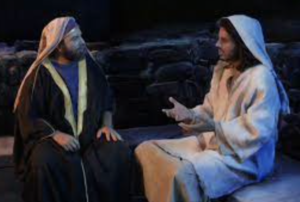
We have met Nicodemus many times before. We have a Pharisee, a Jewish leader, who is struggling with his faith. He meets with Jesus in the dark. That’s purposefully stated in contrast to the following conversation (contained in John 4), the woman at the well where the context is at midday. It’s the complete opposite. Nicodemus is one who doesn’t understand, the woman does understand. Nicodemus is not willing to risk going any further, the woman immediately goes off to her village and tells everyone. Later in John’s Gospel, Nicodemus is found defending Jesus (John 7) and then bringing incredible amounts of smellies (John 19:39 100lbs) [1] for Jesus’ body. Was he the secret believer?

Teacher or Messiah – big difference
Nicodemus tells Jesus that Jesus is a teacher – so he’s not the Messiah as others would suggest – note the Gospel was written probably around 90-110 AD.
Nicodemus has been observant and seen what Jesus has done. There’s mention of Numbers 21: 4-9 where Moses lifted the snake, that sign medics are aware of, he is aware that God protects his people. Jesus notices this: do we look for signs and not faith? Nicodemus has become interested because of the signs at the wedding at Cana and at Capernaum – interesting how news travels fast.
Nicodemus is told that he must be …born again…? The actual written words are, in the Greek, ‘born from above’. It is not about a second birth, or being born again physically which Nicodemus keeps on pursuing. It is an understanding ‘born of God’. But then again, the spoken language of the day was Aramaic, and so some confusion might be possible. Interestingly, Nicodemus is aware that the human one will be lifted high so that everyone who believes in him will have eternal life – again this was written around 90-110 AD. [Note the word ‘crucifixion’ is not used in John’s Gospel]
Just who is this guy?
Historically, there is little evidence for Nicodemus. There is a Gospel according to Nicodemus, but although that speaks of a leader of the Sanhedrin, speaking about Jesus’ resurrection, and even that Pilate becomes a believer of the faith, it is dated no earlier than the 4thC.
Nicodemus is possibly a tale of secrecy. In the Gospel of Nicodemus he reports that Jesus liberated the souls in Hell after the crucifixion. He is the night disciple, the secret believer? Later in the Reformation, Nicodemites were those who said that they were Protestants but held a Catholic belief, or vice versa, or those who stated that they had a belief, if only so that they may go to Heaven upon their death. The Calvinists were horrified at such thought, and responded saying that you couldn’t convert during life as you’d been selected at birth.
Tepid Faith?
Could this happen today? What if people spoke of their faith publicly but inside were not able to hold to what they needed to do, wanted to do. There might be a tussle between head and heart. You could easily look to media stars that purport to hold a Christian faith but their life seems to be very different.
A scholar Scott Clark offers four examples about why people might be Nicodemites:
- Those who do it for money
- Those who try to convert high-born ladies, but who do not take the gospel seriously.
- Those who try to reduce Christianity to a philosophy
- Those merchants and common people who fear danger.
Examples 1 and 2 might be discounted today, but examples 3 and 4 might be viable.
Do we move our faith away so that it is akin to any other belief, such as capitalism?
Or do we so fear death that we believe in God merely to escape the pain of death’s clutches?
When does a real relationship with Jesus become real. I wonder whether Jesus was seeking to really speak with Nicodemus that dark night, or whether Nicodemus wanted a simple solution.
Where Nicodemus struggles with being born again, or from the Greek, from above, it is an invitation to follow Jesus which is seen through what we do. It isn’t that our deeds somehow satisfies God, but that through our belief our deeds tell our story.
John 3:16
So how can we do this? Jesus if often credited as saying John 3:16, but reading it in context strongly suggests that it is the author writing the message of Jesus. The message is for those in darkness, not able to see what God is saying. It is asking us to reconsider what we can do: did Nicodemus hear that message: do we?

For God so loved the world…how do we love the world that God created?
How do we treat justice as one of our priorities? Justice is something that lawyers deal with, isn’t it? If remain in the darkness, we are happy to settle with the status quo, what’s been happening for decades. It might well need us to take a riskier step, to speak truth to the situation, to take a stand. But we are too old for that, we might say. So in conversations with Government we may feel out of our depth, but what about our conversations with friends who make sweeping statements about groups of people. Do we see that as loving by ignoring that situation?
When we hear disparaging statements about refugees, people on their journey, do we duck and ignore the problem, or speak truth? When we hear sweeping negative comments about a group of people, can we, will we, ensure that we are up to speed on that topic so that we can take a stand?
Otherwise, this verse John 3:16 can remain on the wall, one we might quote, smile at,
but remains in the dark parts of our life, not able to be seen in the light of God.
[1] If λίτρας in John 19:39 is meant to be a dry measure then the amount is about seventy-five pounds because the Roman pound was about twelve ounces. Even if λίτρας is meant to be a liquid measure this is a large amount of spices. T. C. De Kruijf (‘“More Than A Half A Hundredweight”’, 23) suggests that λίτρας in 19. 39 is a liquid measure amounting to four and a half imperial gallons.
I found the dialogue interesting and I enjoyed it